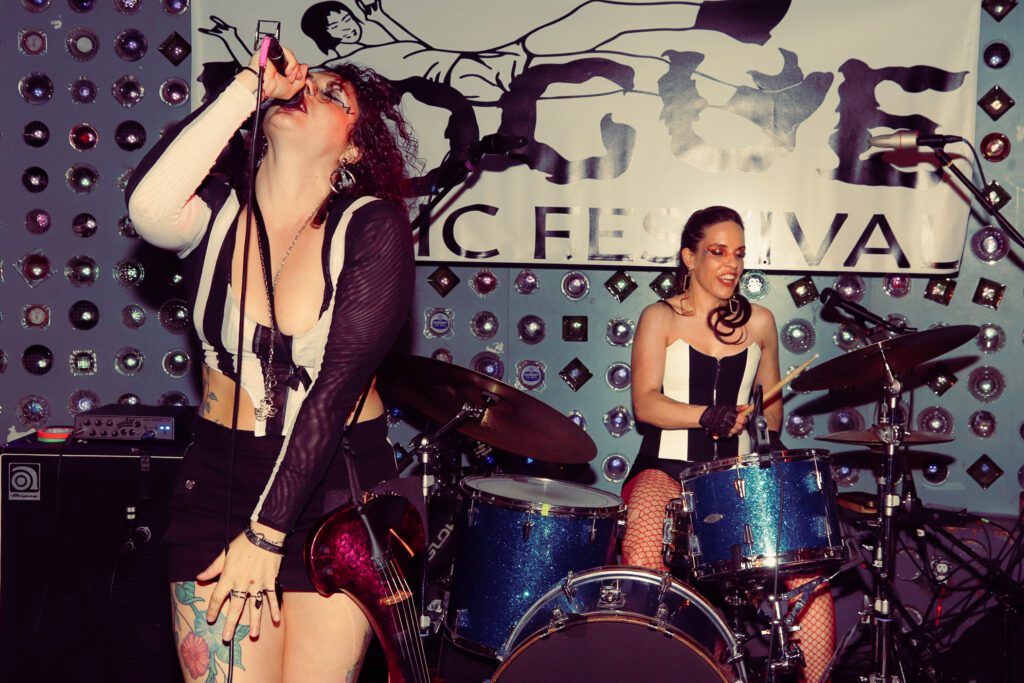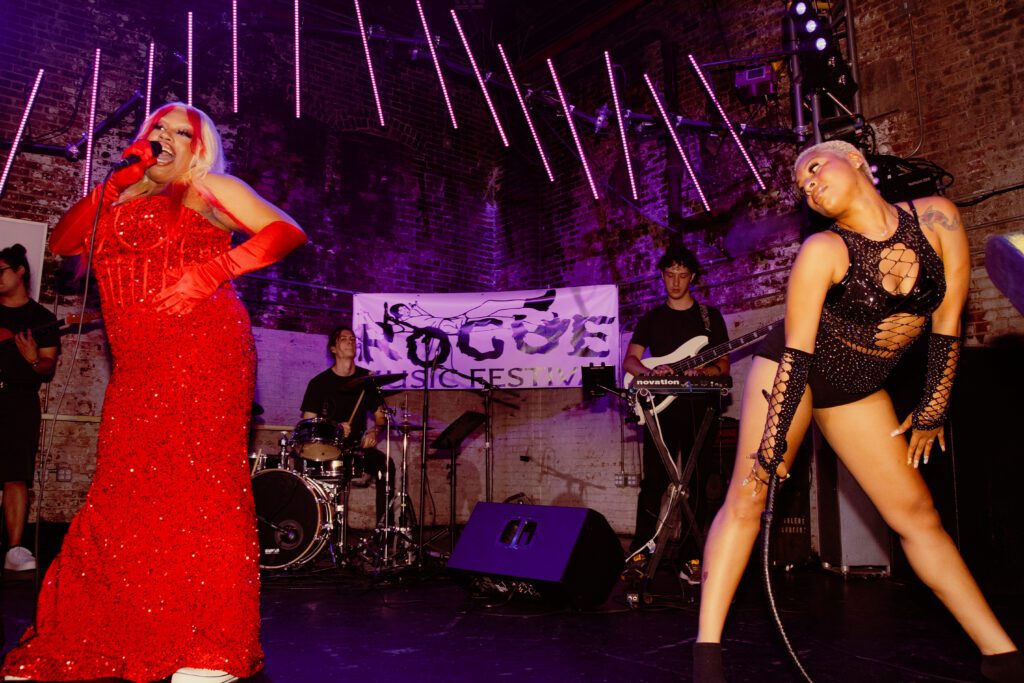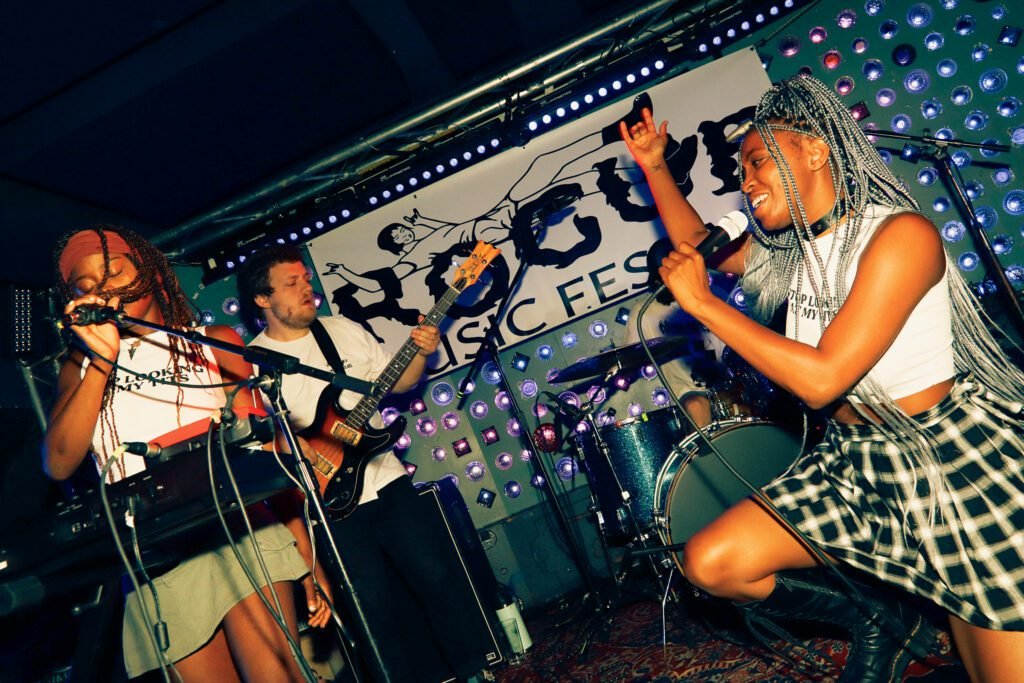
Like an out-of-tune Telecaster, the live music ecosystem could use some calibration.
Efforts to slash deceptive and monopolistic practices of ticket sellers and venues alike have already been set in motion by lawmakers and local music advocates — there’s a law demanding fee disclosure on ticket sales, a proposed bill to boost streaming royalties for artists and a public outcry against merch cuts.
But still, artists are struggling to capitalize on their craft.
Enter Rogue Music Festival. From August 9 to 11, the three day 21-band extravaganza will enforce a generous payment model and artist-first ethos to address various inequities plaguing the music industry right here in Brooklyn.
In its second year, the queer, female musician-run concert event, founded by Roni Corcos, Natalie Field and Amy Klein, is trying to set a precedent for local venues: ditch exorbitant room fees and adopt high-percentage splits on ticket sales in favor of independent artists playing the bill.
“Music in and of itself is so valuable and should be more highly compensated in spaces that are able to host it,” says Field, who works as the show booker at Cassette (formerly Sundown) in Ridgewood.

Rogue Music Festival founders (from left): Corcos, Field and Klein (Photo by Kian Gannon)
Demystifying ticket buying
Each day, the festival will take place at a different Brooklyn nightlife staple – Baby’s All Right, 3 Dollar Bill, then Starr Bar – hand-selected by Corcos, Field and Klein based on good vibes, great sound, and a willingness to adopt Rogue’s financial model, with 70 percent of every ticket sold going directly to the bands, and the rest being used to pay the crew, vendors and the venues.
“Money exists in the music industry, it’s just not fairly distributed,” says Corcos, whose band Roni will play on the third day.
“People do not come to a live festival because it’s ‘Rogue Music Festival’ – they come because of the bands that play there,” Corcos continues. “It’s just correct that we compensate these bands for the majority of the money from the ticket.”
“It’s really hard for artists to actually make a profit, let alone a living,” says Sandile Mhlaba, a queer Brooklyn-based alt-rocker also playing on the third day of Rogue Fest. “There’s definitely room for more models that prioritize paying the artists while being transparent to the fans about how much of their ticket actually goes to the artists. I think it could catch on.”
Rogue’s high-percentage ticket split also works to demystify ticket buying for show-goers and fans.
“People know where their money is going,” says Corcos, adding that this shared awareness helped stoke positive energy among last year’s 800 ticket buyers. “Everybody was chill.”
And yet, according to both Corcos and Field, some Brooklyn clubs weren’t down for the 70/30 split.
Depending on how well-attended a show is, steep room fees can eat up the majority of ticket sales, leaving bands to split a meager payout, or worse.
“Sometimes we get nothing,” says Corcos, an outcome that kept her from playing particular venues across the borough, and, eventually, starting Rogue Fest.
“I definitely had experiences, unfortunately, where the overhead in a place was so high that we almost owed them money for playing,” says Shilpa Ray, a legendary New York rocker and Rogue Fest headliner. “Things like that happen all the time. There are a few venues around here that you’d have to sell out in order to see anything, which is really tough.”
James Wilson of Paisley Fields, a queer country outfit playing day two of Rogue Fest, says these low paydays often pose a Catch-22.
“You’re missing out on an opportunity if you say no to something, so usually I just suck it up and lose money and play the event,” they say. “Hopefully it’s worth the connections I make in building a fan base; hopefully I sell enough merch to cover my costs.”
Wilson jokes that they are basically a truck driving T-shirt salesman, “and then once in a while I get to play music.”

Slut Magic at last year’s Rogue Music Fest (Photo by Kian Gannon)
A novel approach
“Room fees can be gouge-y for sure,” says Alex Gleeson, who has been booking shows at Baby’s All Right since 2019. “But the cost of running a venue in New York is kind of mind blowing, especially a space in a prime real estate area like the gloriously gentrified Williamsburg.”
Gleeson explains that there is no handbook for deciding venues’ payout dynamics; it can change venue to venue, even show to show, and is highly dependent on certain factors like location, room capacity, and the expected age of attendees (this can dictate how many security guards are needed per show).
To Gleeson, Rogue Fest’s financial model and mission statement, which he says aligns with Baby’s ethos around hiring and supporting artists, represent “a really novel approach” to ticket-buying and artist compensation. Yet, he is doubtful that it can be adopted at a major scale.
“There would be serious pushback at certain venues and by certain promoters,” he says. “Certain people benefit from the murkiness [of ticket buying] on an operational level.”
Diverse lineup, diverse sound
Rogue Fest’s founders are using grassroots tactics to tackle what they can, while putting on an accessible and engaging festival experience.
This includes tapping into local sponsors like Variety Coffee and Haven Boxing, as well as assembling a diverse lineup of both prominent acts (Shilpa Ray; Screaming Females’ Marissa Paternoster’s solo project Noun; Cassie Ramone of Vivian Girls) and up-and-coming artists actively devoted to Brooklyn’s live music scene.
“It’s important for us to have a representation of queer and femme communities as well as people of color,” Corcos says, adding that around 85 percent of this year’s lineup identify as LGBTQIA+, while over half the artists are BIPOC, and the vast majority of bands are femme-identifying, whether they are trans, cis, or nonbinary.
“The music industry is so male dominated, so I think anything that seeks to break that up is really important,” Field adds.
Rogue Fest’s lineup also runs the gamut in terms of genre, with acts rooted in hip-hop (Sammus), country (Paisley Fields), “trash rock” (Balaclava), indie-pop (Debbie Dopamine), and ambient (OHYUNG). There’s even a “silkpunk” band called p.h.0. that plays metal with traditional Chinese instruments.
By hosting a wide array of bands with a similar commitment to the local music scene, the Rogue Fest founders hope to garner authentic connections among the artists that they can use when booking future shows with multi-band bills.
For Ray, networking is essential to growing as an artist. “They definitely put a bunch of bands together that I’m like, ‘Oh, I really like this person’s music, but I’ve never met them before.’”
Last year, Rogue Fest was able to pay bands a minimum of $250. But this year, with 19 fewer bands (the founders agreed that hosting 13 acts per day across three different venues was too chaotic) and ticket prices up from $20 to $30 per day, Corcos, Field and Klein are hoping they can pay artists even more.
“Hopefully we can work up to a place where we’re consistently paying bands major festival prices,” says Field, “and we can show that a small Brooklyn DIY fest is capable of paying musicians what we think they’re worth.”

MegaGoneFree at last year’s Rogue Music Fest (Photo by Kian Gannon)
The post Rogue Music Festival returns for a second year, promising to pay artists what they deserve appeared first on Brooklyn Magazine.

